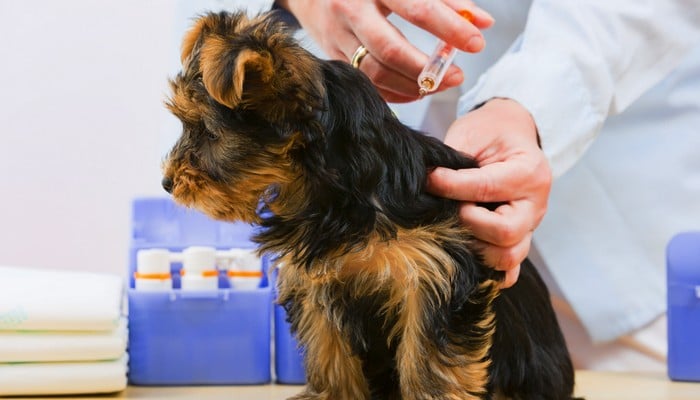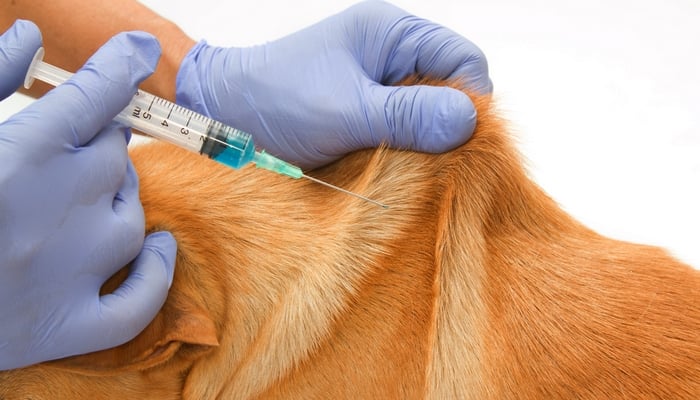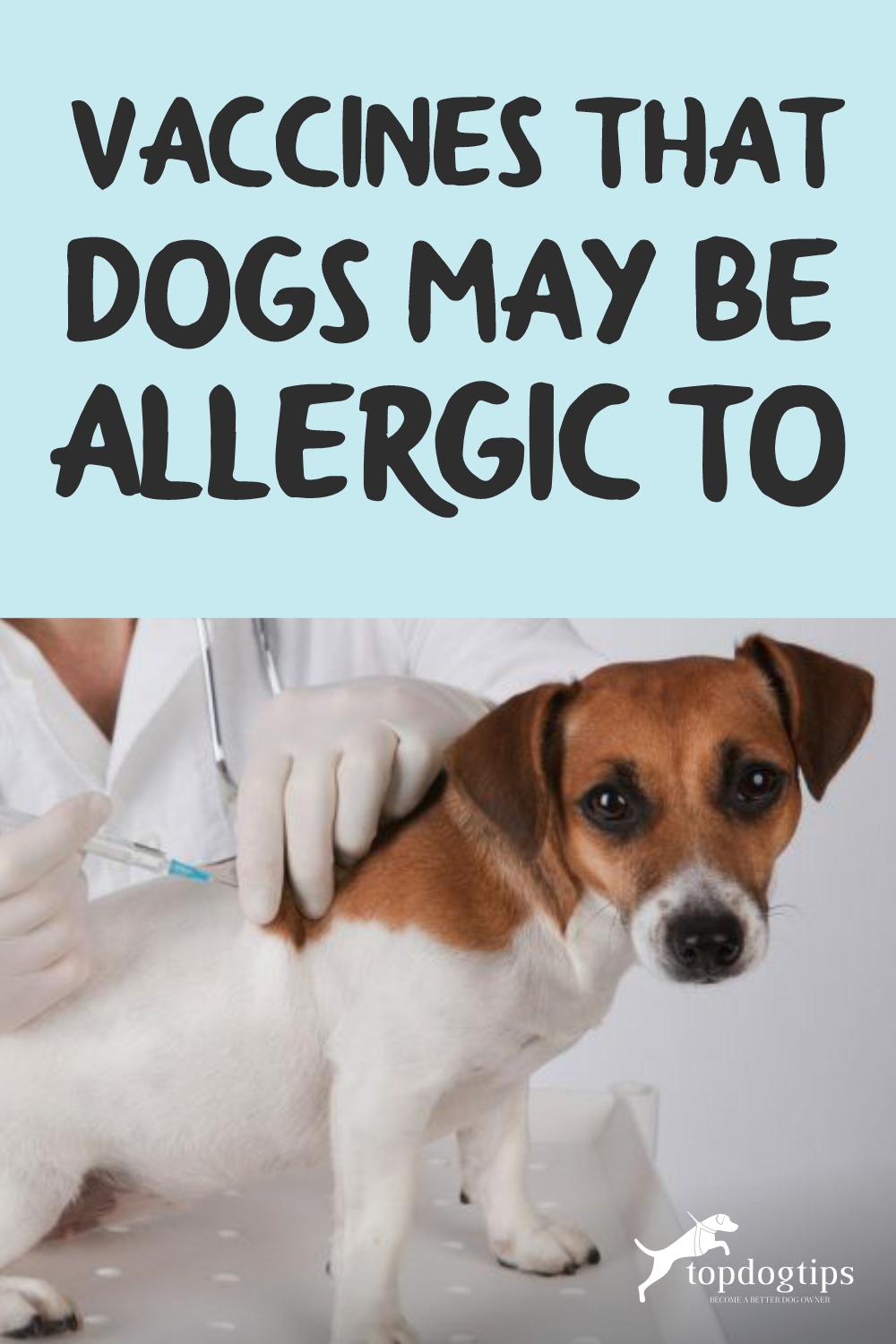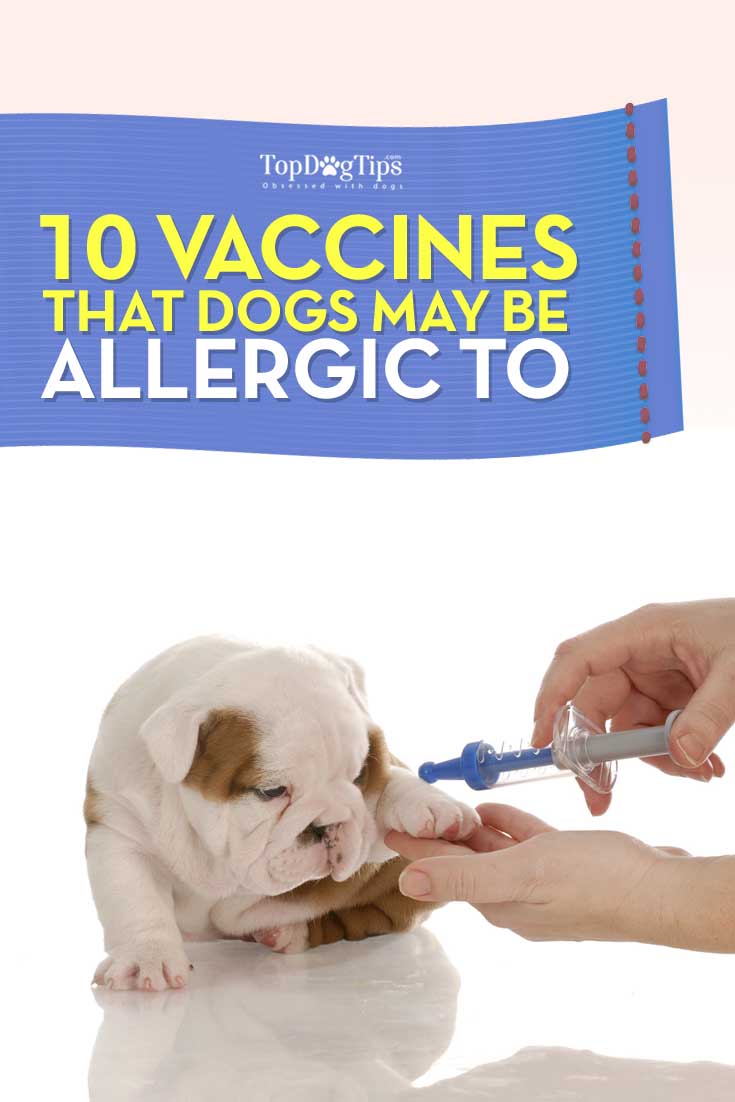
Vaccines protect our dogs from certain illnesses and diseases. They are extremely important. Vaccines are classed as “Core,” which should be given to all dogs, and “Noncore,” which are recommended for certain dogs and will depend on your pet’s age, breed, overall health, and the risk of exposure to the disease. However, there are some vaccines that dogs may be allergic to.
Vaccines can cause allergic reactions and side effects in dogs, just like humans. While this is rare, it is important that you are aware of the symptoms to be looking out for once your dog has received any vaccination. Your veterinarian should go over these signs with you at the time of vaccination; if not, be sure to ask.
Vaccinating your dog is essential to his overall health, as the illnesses and diseases that they are protecting your dog from can be very serious and potentially life-threatening.
The benefits that come from vaccinating your pet far outweigh the risks, and you should remember that most side effects and allergic reactions are usually mild. Your vet will be able to treat any reactions and side effects that take place.

10 Vaccines That Dogs May Be Allergic To
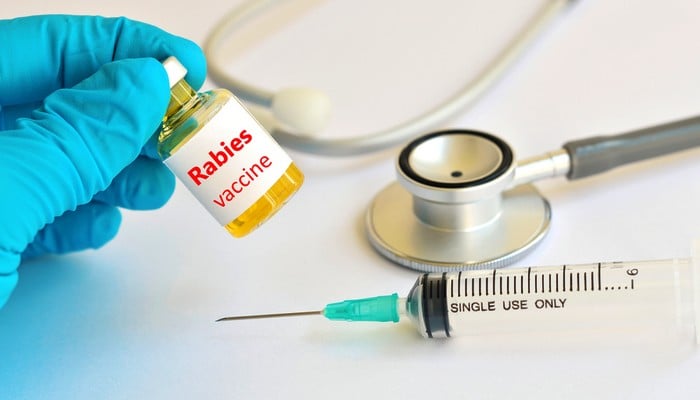 1. Parvovirus
1. Parvovirus
The Parvovirus vaccine is one of the core vaccines that dogs may be allergic to. Your dog will definitely require it to stay healthy, but he may experience pain and swelling at the injection site. He could also be less energetic for a day or so after the injection has been given.
It is also likely that your dog may develop a mild fever and have a decrease in appetite. These symptoms will disappear in a day or so. Parvovirus is contagious and very dangerous. It is much safer to give your dog the vaccination than not.
2. Canine distemper
The canine distemper vaccine is another of the core vaccines, and it is absolutely essential for your dog. Canine distemper is a serious health condition that will really affect your pet and his organs. The vaccine can cause reactions and these may include soreness at the injection site, lower energy levels and maybe a mild fever.
RELATED ARTICLE: What Shots Do Puppies Need? Dog Vaccination Schedule
These symptoms will go away in a day or so after your dog received the injection. The canine distemper vaccine has been linked to inflammation of the brain, as well. Ask your vet about this and the symptoms you should be looking out for.
3. Hepatitis
The Hepatitis vaccine is another of the core vaccines that dogs may be allergic to. Your pet will definitely need it to stay healthy. Allergic reactions can occur and there are side effects to look out for. These can include a reduction in appetite, mild fever, and soreness at the injection site.
4. Rabies
The Rabies vaccine is another of the core vaccines and will protect your dog from rabies, which is a very serious disease. Dogs that have been vaccinated against rabies will have very little chance of contracting the disease. The rabies vaccine can also cause reactions and side effects, they are, however, usually mild.
Your dog may be less energetic after the vaccine and may be tender at the site of the injection. The rabies injection contains a killed virus and these vaccines have been known to cause anaphylactic shock in some dogs.
This is a very serious medical emergency that causes seizures, vomiting, shock, and diarrhea. Emergency treatment is essential.
5. Parainfluenza
This is a non-core vaccine, so it’s up to you and your vet if you want your dog to receive it or not. It is recommended to dogs that stay in kennels, boarding facilities, or shelters and for dogs that go to shows. If you do want your dog to have this vaccine then you can have it administered every year, to keep him healthy.
RELATED: 12 Health Benefits of Coconut Oil for Dogs
As with other vaccines that dogs may be allergic to, your pet can develop a reaction after receiving this one. The signs to watch for include tenderness at the injection site, lower energy levels, and possibly a mild fever.
6. Bordetella
Bordetella is another of the noncore vaccines that dogs may be allergic to. Your vet will advise you on whether or not your Fido needs to have this vaccine. The Bordetella vaccine will protect your dog against kennel cough, which can cause him a great deal of distress.
Kennel cough is highly contagious in dogs, so it's best to have your dog vaccinated if he frequents a facility where this disease is prevalent, such as kennels or boarding facilities. If your dog is at high risk of developing kennel cough, your vet will recommend that he has the Bordetella vaccine.
7. Leptospirosis
This is a noncore vaccine, so again your vet will be the best one to advise you on whether your dog really needs it. Nearly 30% of dogs don’t respond well to this vaccine.
The side effects of the Leptospirosis vaccine are high. It contains a killed virus that can potentially cause anaphylactic shock, which can be fatal if not treated fast enough. Symptoms of this can include seizures, shock, vomiting, and also diarrhea.
8. Coronavirus
This is another non-core vaccine and is recommended for dogs that are at high risk of exposure. These dogs may visit kennels, shows, and shelters and are mixing with other dogs frequently in public places. If you live in an area where canine coronavirus is present, then it is highly recommended that you vaccinate your dog against it.
Reactions and side effects are usually mild and could include soreness at the injection site, lethargy, mild fever, and a loss of appetite. These symptoms will disappear in a day or so after the injection has been given.
9. Lyme
This is another non-core vaccine and is recommended to protect dogs from infectious tick-borne diseases. Lyme disease is a serious medical condition and will make your dog feel very poorly indeed. To ensure he is protected from Lyme disease, your vet will recommend this vaccine to you.
RELATED: Holistic Dog Health 101: Ultimate Science-based Guide
The side effects and reactions to this vaccine are moderate and you should be looking out for symptoms that include lethargy, loss of appetite, tenderness at the injection site, and possibly a mild fever.
10. Canine adenovirus -2 (CAV -2)
The Canine adenovirus -2 is a non-core vaccine that is recommended for dogs that may be at risk of kennel cough. This vaccine is recommended for dogs that stay in kennels, shelters, and for those who go to shows. This vaccine does have side effects and your dog could develop an allergic reaction too.
The canine adenovirus -2 can make your dog lose his appetite for a day or so, and he may also have pain at the injection site. Lethargy is common and so too is a mild fever. This vaccine can also cause eye inflammation in some dogs.
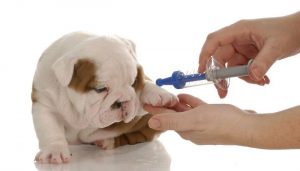 We love our dogs and want them to stay strong and healthy. By vaccinating your dog, you really are helping him thrive.
We love our dogs and want them to stay strong and healthy. By vaccinating your dog, you really are helping him thrive.
The illnesses and diseases that the vaccines are protecting your pet from are very serious and will make him extremely sick. They could potentially be life-threatening.
The main thing to remember is that most dogs will respond well to the vaccines and won’t develop any side effects or reactions. If they do, the reaction will usually only be mild. Some dogs are more sensitive than others and may develop allergic reactions, but, as long as you are watching your dog carefully for any side effects he will be fine.
Although there are vaccines that dogs may be allergic to, your vet will be able to treat any reaction your Fido may have. Vaccinating your dog is extremely important and could save his life.
WANT TO SHARE THIS?


